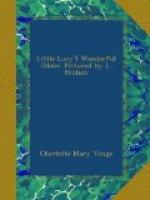Peder gave a curious long cry, put his hand in his pocket, and pulled out a lump of salt. Presently, a pair of long horns appeared, then another, then a whole herd of the deer with big heads and horns growing a good deal forward. The salt was held to them, and a rope was fastened to all their horns that they might stand still in a line, while the little Lapp women milked them. Peder went up to one of the women, and brought back a little cupful of milk for his visitor; it was all that one deer gave, but it was so rich as to be almost like drinking cream.
He led her into one of the tents, but it was very smoky, and not much cleaner than the tent of the Esquimaux. It is a wonder how Lucy could go to sleep there, but she did, heartily wishing herself somewhere else.
CHAPTER VIII. CHINA.
Was it the scent of the perfumed tea, a present from an old sailor friend, which Mrs. Bunker was putting away, or was it the sight of the red jar ornamented with black-and-gold men, with round caps, long petticoats, and pigtails, that caused Lucy next to open her eyes upon a cane sofa, with cushions ornamented with figures in colored silks? The floor of the room was of shining inlaid wood; there were beautifully woven mats all round; stands made of red lacquer work, and seats of cane and bamboo; and there was a round window, through which could be seen a beautiful garden, full of flowering shrubs and trees, a clear pond lined with colored tiles in the middle, and over the wall the gilded roof of a pagoda, like an umbrella, only all in ridge and furrow, and with a little bell at every spoke. Beyond, were beautifully and fantastically shaped hills, and a lake below with pleasure boats on it. It was all wonderfully like a pretty china bowl come to life, and Lucy knew she was in China, even before there came into the room, toddling upon her poor little, tiny feet, a young lady with a small yellow face, little slips of eyes sloping upwards from her flat nose, and black hair combed up very tight from her face and twisted with flowers and ornaments. She had ever so many robes on, the edge of one peeping out below the other, and at the top a sort of blue China-crape tunic, with very wide, loose sleeves dropping an immense way from her hands. There was no gathering in at the waist, and it reached to her knees, where a still more splendid white silk, embroidered, trailed along. She had a big fan in her hand; but when she saw the visitor she went up to a beautiful little, low table, with an ivory frill round it, where stood some dainty, delicate tea-cups and saucers. Into one of these she put a little ball, about as big as an oak-apple, of tea-leaves; a maid dressed like herself poured hot water on it, and handed it on a lacquer-work tray. Lucy took it, said, “Thank you,” and then waited.
“Is it not good?” said the little hostess.
“It must be! You are the real tea people,” said Lucy: “but I was waiting for sugar and milk.”




